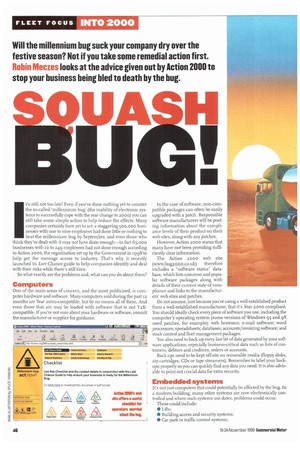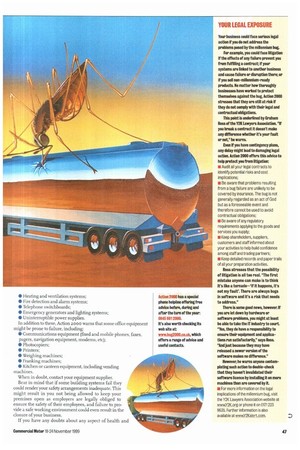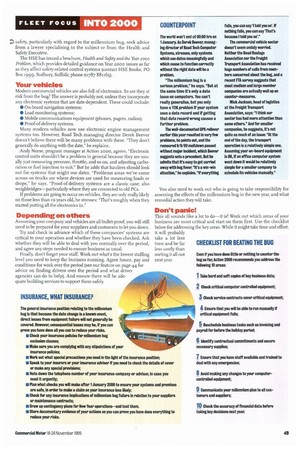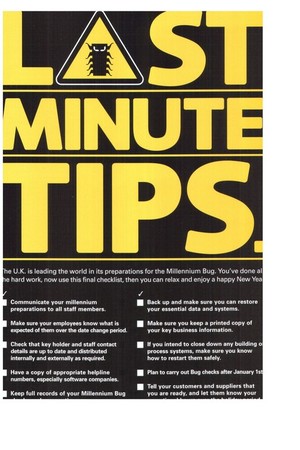FLEET FOCUS INTO 2000
Page 48

Page 49

Page 51

Page 50

If you've noticed an error in this article please click here to report it so we can fix it.
Will the millennium bug suck your company dry over the festive season? Not if you take some remedial action first. Robin Meczes looks at the advice given out by Action 2000 to stop your business being bled to death by the bug.
t's still not too late! Even if you've done nothing yet to counter the so-called 'millennium bug' (the inability of electronic systems to successfully cope with the year change to 2000) you can still take some simple action to help reduce the effects. Many companies certainly have yet to act: a staggering soo,000 businesses with one to nine employees had done little or nothing to beat the millennium bug by September, and even those who think they've dealt with it may not have done enough—in fact 65,000 businesses with ro to 249 employees had not done enough according to Action 2000, the organisation set up by the Government in 1998 to help get the message across to industry. That's why it recently launched its Last Chance guide to help companies identify and deal with their risks while there's still time.
So what exactly are the problems and, what can you do about them?
Computers
One of the main areas of concern, and the most publicised, is computer hardware and software. Many computers sold during the past 12 months are Year 2000-compatible, but by no means all of them. And even those that are may be loaded with software that is not Y2Kcompatible. lf you're not sure about your hardware or software, consult the manufacturer or supplier for guidance. In the case of software, non-cornpatible packages can often be easily upgraded with a patch. Responsible software manufacturers will be posting information about the compliance levels of their product on their web sites, along with any patches.
However, Action 2000 warns that many have not been providing sufficiently clear information.
The Action 2000 web site (www.bugz000.co.uk) therefore includes a "software status" database, which lists common and popular software packages along with details of their current state of compliance and links to the manufacturers' web sites and patches.
Do not assume, just because you're using a well-established product
from a well-established manufacturer, that it's Year 2000 compliant.
You should ideally check every piece of software you use, including the
computer's operating system (some versions of Windows 95 and 98
need patches, for example); web browsers; e-mail software; word
processors; spreadsheets; databases; accounts/invoicing software; and
stock control and fleet management packages.
You also need to back up every last bit of data generated by your soft ware applications, especially business-critical data such as lists of cus tomers, debtors and creditors, orders or accounts.
Back ups need to be kept off-site on removable media (floppy disks,
zip cartridges, CDs or tape streamers). Remember to label your back ups properly so you can quickly find any data you need. It is also advis able to print out crucial data for extra security.
Embedded systems
It's not just computers that could potentially be affected by the bug. In a modern building, many other systems are now electronically controlled and where such systems use dates, problems could occur. These could include:
• Lifts; • Building access and security systems; • Car park or traffic control systems; • Heating and ventilation systems; • Fire detection and alarm systems; • Telephone switchboards; • Emergency generators and lighting systems; • Uninterruptible power supplies.
In addition to these, Action z000 warns that some office equipment might be prone to failure, induding: • Communications equipment (fixed and mobile phones, faxes, pagers, navigation equipment, modems, etc); • Photocopiers; • Printers; • Weighing machines; • Franking machines; • Kitchen or canteen equipment, including vending machines.
When in doubt, contact your equipment supplier.
Bear in mind that if some building systems fail they could render your safety arrangements inadequate. This might result in you not being allowed to keep your premises open as employers are legally obliged to ensure the safety of their employees, and failure to provide a safe working environment could even result in the closure of your business.
If you have any doubts about any aspect of health and safety, particularly with regard to the millennium bug, seek advice from a lawyer specialising in the subject or from the Health and Safety Executive.
The HSE has issued a brochure, Health and Safety and the Year 2000 Problem, which provides detailed guidance on Year 2000 issues as far as they affect safety-related control systems (contact H SE Books, PO Box t 999, Sudbury, Suffolk; phone 01787 881165).
Your vehicles
Modern commercial vehicles are also full of electronics. So are they at risk from the bug? The answer is probably not, unless they incorporate any electronic systems that are date-dependent. These could include: • On-board navigation systems; • Load monitoring systems; • Mobile communications equipment (phones, pagers, radios); • Proof-of-delivery systems.
Many modern vehicles now use electronic engine management systems too. However, Road Tech managing director Derek Beevor doesn't believe there will be many problems with these. They don't generally do anything with the date," he explains.
Andy Nurse, program manager at Action 2■000, agrees. "Electronic control units shouldn't be a problem in general because they are usually just measuring pressure, throttle, and so on, and adjusting carburation or fuel injection to suit." But he adds that hauliers should look out for systems that might use dates. "Problems areas we've come across on trucks are where devices are used for measuring loads or drops," he says. "Proof-of-delivery systems are a classic case; also weighbridges—particularly where they are connected to old PCs.
If problems are going to occur on vehicles, they are only really likely on those less than to years old, he stresses: "That's roughly when they started putting all the electronics in."
Depending on others
Assuming your company and vehicles are all bullet-proof, you will still need to be prepared for your suppliers and customers to let you down.
Try and check in advance which of these companies' systems are critical to your operation and whether they have been checked. Ask whether they will be able to deal with you normally over the period, and agree any steps needed to ensure business as usual.
Finally, don't forget your staff. Work out what's the lowest staffing level you need to keep the business running. Agree hours, pay and conditions for work over the period (see our feature on Page 44 for advice on finding drivers over the period and what driver agencies can do to help). And ensure there will be axle(pate building services to support them safely. You also need to work out who is going to take responsibility for assessing the effects of the millennium bug in the new year, and what remedial action they will take.
Don't panic!
This all sounds like a lot to do—it is! Work out which areas of your business are most critical and start on them first. Use the checklist below for addressing the key areas. While it might take time and effort, it will probably take a lot less
time and be far CHECKLIST FOR BEATING THE BUG less costly than sorting it all out Even if you have done little or nothing to counter the next year. bug so far, Action 2000 recommends you address the
following 10 areas:
1 Take hard and soft copies of key business data; 2 Check critical computer controlled equipment; 3 Check service contracts cover critical equipment; 4 Ensure that you will be able to run manually if critical equipment fails; 5 Reschedule business tasks such as invoicing and payroll for before the holiday period; 6 Identify contractual commitments and secure necessary supplies; 7 Ensure that you have staff available and trained to deal with any emergencies; 8 Avoid making any changes to your computercontrolled equipment; 9 Communicate your millennium plan to all customers and suppliers; 10 Check the accuracy of financial data before taking key decisions next year.
COUNTERPOINT
The world won't end at 00:00 hrs on 1 January. As Derek Beevor, managing director of Road Tech Computer Systems, stresses, only systems which use dates meaningfully and which cease to function correctly without the right date will be a problem.
"The millennium bug is a serious problem," he says. "But at the same time it's only a date Issue on computers. You can't really generalise, but you only have a Y2K problem if your system uses a date record and if getting that date record wrong causes a further problem.
The well-documented GPS rollover earlier this year resulted in very few problems, he points out, and the rumoured 9/9/99 meltdown passed without major incident, which Beaver suggests sets a precedent. But he admits that it's easy to get carried away with bugfever. It's a win-win situation," he explains. If everything fails, you can say 1 told you so'. If nothing fails, you can say 'That's because I told you so'," The commercial vehicle sector doesn't seem unduly worried. Neither the Road Haulage Association nor the freight Transport Association has received huge numbers of calls from members concerned about the bug, and a recent FTA survey suggests that most medium and large member companies are actually well up on counter-measures.
Mick Jackson, head of logistics at the Freight Transport Association, says: "I think our sector has had more attention than some others." And for smaller companies, he suggests, it's not quite as much of an issue: "At the end of the day, the transport operation is a relatively simple one. Assuming your on-board equipment is OK, if an office computer system went down it would be relatively simple for a smaller company to schedule its vehicles manually."
INSURANCE, WHAT INSURANCE?
The general insurance position relating to the millennium bug is that because the date change is a known event, direct losses from equipment failure will not generally be covered. However, consequential losses may be, if you can prove you have done all you can to reduce your risks.
• Check your insurance policies for millennium bug exclusion clauses; • Make sure you are complying with any stipulations of your Insurance policies; • Work out what special precautions you need in the light of the insurance position; • Speak to your insurers or your insurance adviser if you need to check the details of cover or make any special provisions; • Note down the telephone number of your insurance company or adviser, in case you need it urgently;
II Plan what chocks you will make after 1January 2000 to ensure your systems and premises are safe, In order to make a claim on your insurance less likely;
• Check for any Insurance implications of millennium bug failure in relation to your suppliers or maintenance contracts; • Draw up contingency plans for New Year operations—and test them.
• Store documentary evidence of your actions so you can prove you have done everything to reduce your risks.
YOUR LEGAL EXPOSURE
Your business could face serious legal action if you do not address the problems posed by the millennium bug.
For example, you could face litigation if the effects of any failure prevent you from fulfilling a contract; if your systems are linked to another business and cause failure or disruption there; or if you sell non-millennium-ready products. No matter how thoroughly businesses have worked to protect themselves against the bug, Action 2000 stresses that they are still at risk if they do not comply with their legal and contractual obligations.
This point is underlined by Graham Ross of the Y2K Lawyers Association. if you break a contract it doesn't make any difference whether it's your fault or not," he warns,
Even If you have contingency plans, any delay might lead to damaging legal action. Action 2000 offers this advice to help protect you from litigation:
WI Audit all your legal contracts to identify potential risks and cost implications;
• Be aware that problems resulting from a bug failure are unlikely to be covered by insurance. The bug is not generally regarded as an act of God but as a foreseeable event and therefore cannot be used to avoid contractual obligations;
• Be aware of any regulatory requirements applying to the goods and services you supply; • Keep shareholders, suppliers, customers and staff informed about your activities to help build confidence among staff and trading partners; • Keep detailed records and paper trails of all your preparation activities.
Ross stresses that the possibility of litigation is all too real. "The first mistake anyone can make is to think It's like a tornado—if it happens, it's not my fault'. There are always bugs in software and it's a risk that needs to address."
There is some good news, however. If you are let dawn by hardware or software problems, you might at least be able to take the IT industry to court. "Yes, they do have a responsibility to ensure their equipment and applications run satisfactorily," says Ross. "And just because they may have released a newer version of the software makes no difference."
However, he warns anyone contemplating such action to double-check that they haven't invalidated their software licence by installing it on more machines than are covered by it.
• For more information on the legal implications of the millennium bug, visit the Y2K Lawyers Association website at wwwY2K.org or phone it on 0171223 9635. Further information is also available at www.Y2Kalert.com.
he U.K. is leading the world in its preparations for the Millennium Bug. You've done al e hard work, now use this final checklist, then you can relax and enjoy a happy New Yea
Communicate your millennium preparations to all staff members.
Make sure your employees know what is expected of them over the date change period.
Check that key holder and staff contact details are up to date and distributed internally and externally as required.
Have a copy of appropriate helpline numbers, especially software companies.
Keep full records of your Millennium Bug III Back up and make sure you can restore your essential data and systems.
• Make sure you keep a printed copy of your key business information.
• If you intend to close down any building o process systems, make sure you know how to restart them safely.
• Plan to carry out Bug checks after January is MI Tell your customers and suppliers that you are ready, and let them know your
















































































































